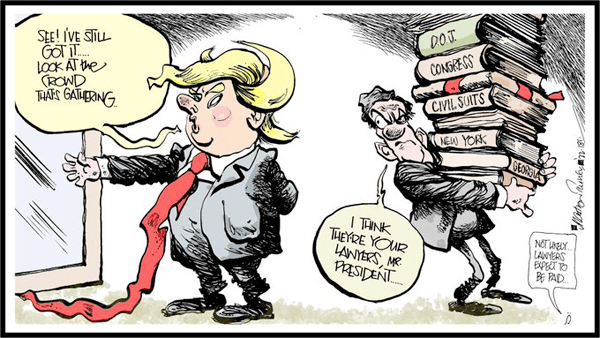CSotD: Vain regret and vain vanity
Skip to comments
I’m not big on year-end wrap-ups, which — as noted before — I learned to hate in the newsroom, when we had to compile them in order to fill the pages in the dead space between Christmas and New Years. I also have little interest in reliving the major events of the year gone past, because, at least in terms of 2022, I’m lined up with Stephen Dedalus: History is a nightmare from which I am trying to awake.
But I like Pedro X. Molina (Counterpoint)‘s one-panel take, because there were some small victories scattered in there, and he doesn’t make the error of celebrating them too soon and too riotously. We’ve probably seen the last of Walker and Oz, though there will be others, while neither Ye nor Jones are any more likely to shut up than Trump.
As for Elon Musk, he’s still very much in play, but if you like your schadenfreude sharp and hot, here’s an analysis of how his year has gone and where it’s likely headed. It cracked me up in part because, like Molina, she knows not to overplay a good hand, plus I read it about the same time I barely got into one of those smug, witty year-end summaries before giving up.
Wit is both overrated and outdated. There was a time when Johnny Carson or Jay Leno could make witty jokes about the news, but the emergence of Jon Stewart, John Oliver and Trevor Noah have made it incumbent to have a point of view, not just a stable of joke writers.
There are coincidental connections to the news that are funnier than the witty commentaries, as seen in this
Juxtaposition of the Day


I’m sure neither Kieran Meehan nor Dan Thompson had any idea that newly-elected Congressman George Santos (R-Fantasyland) was going to come along and add spice to these gags, but they are funnier for that unintentional context.
There’s probably something sad about the George Santos story, but it’s not like the Runaway Bride saga that, in 2005, had everyone laughing at a young woman with serious emotional issues.
It’s quite likely that Santos has some genuine issues as well, but, like Donald Trump (or OJ Simpson or Jeffrey MacDonald), his ability to spin tales is a self-protective cocoon that, if not entirely deliberate, still seems worth unraveling, if only for the sake of justice, whether that justice includes jail time or not.
Though, come to think of it, maybe the solution to the GOP’s dilemma is to spin off a “Delusional Fabulist Party.” It would sure make Kevin McCarthy’s job easier.

Lord knows, the Delusional Fabulist Party would have plenty of supporters. As Jeff Danziger (Counterpoint) points out, not only did Trump lie about being audited before the 2016 election, but we’ve since learned that the IRS was not performing the legally required audits of his tax returns while he was in office.
The response? First, the party faithful spun IRS funding for more staff into a lie about 87,000 armed agents targeting middleclass taxpayers, and now there are members of Congress demanding that Biden’s returns also be made public, apparently unaware that they have long since been released.
Are they lying or are they genuinely that ignorant?
Wrong question. Question is, what difference would it make?
The Delusional Fabulist Party demands answers!!!
Juxtaposition of the Whole World is Watching

(Martyn Turner — the Irish Times)

(Peter Brookes — the Times of London)
The whole world is not only watching, but wondering why we allow our politicians to get away with lying, with graft and with pulling con games in general.

So are we, or, at least, some of us, the difference being that Turner and Brookes can only look on in wonder while Americans, ostensibly, have some control over what happens next. But Clay Bennett (CTFP) presents it as, at best, “Are these the shadows of the things that Will be, or are they shadows of things that May be, only?”
Well, as Scrooge hopefully argued, “Men’s courses will foreshadow certain ends, to which, if persevered in, they must lead, but if the courses be departed from, the ends will change. Say it is thus with what you show me!”
The Spirit didn’t answer, but, as far as George Santos goes, it reminds me of “All the President’s Men,” when Deep Throat scoffs at the idea that all of Watergate was the work of little Donald Segretti. The Segrettis are more witnesses than villains.
It does, however, makes sense to start from the bottom and work your way to the top, as long as you do, in fact, keep working your way to the top.

And John Deering (Creators) reminds us that there are other delusional screwballs atop major nations.
We learned in Iraq that Saddam Hussein employed a level of hot air specific to his culture, in which empty bombast about the Mother of All Battles and suchlike were, as they said later of Trump’s braggadocio, things to be taken seriously but not literally.
Putin’s game seems comparatively unclear, because, as Deering notes, his statements, individually, don’t seem insane until you string them together and realize they can’t possibly all be true, particularly the ones in which he contradicts himself.
His openness to negotiate an end to the war brings to mind the old barroom joke, “Let me up; you’ve had enough!” unless he wants to start the negotiations back where they were 31 years ago, when Ukraine had nuclear weapons on its soil and the crumbling Soviet Union was offering to respect its borders in exchange for disarmament.
In the meantime, someone is littering the Ukrainian landscape with pieces of Iranian drones, and, if it’s not Vloshka, we should probably find out who it is.

Marian Kamensky (Cartoon Movement) points out one of the benefits of leadership in a generally closed system: When China’s draconian attempts to stop the spread of covid didn’t work, and their vaccines seemed equally ineffective, Xi Jinping chose the option of simply no longer publishing statistics.
Which doesn’t keep us from knowing they are in trouble, but it does keep us from knowing how much.
And not knowing is half the battle, if that’s the battle you seek.


Comments 3
Comments are closed.